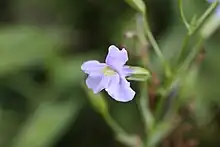Mimulus ringens
Mimulus ringens is a species of monkeyflower known by the common names Allegheny monkeyflower and square-stemmed monkeyflower.
| Mimulus ringens | |
|---|---|
 | |
| Scientific classification | |
| Kingdom: | Plantae |
| Clade: | Tracheophytes |
| Clade: | Angiosperms |
| Clade: | Eudicots |
| Clade: | Asterids |
| Order: | Lamiales |
| Family: | Phrymaceae |
| Genus: | Mimulus |
| Species: | M. ringens |
| Binomial name | |
| Mimulus ringens | |
It is native to eastern and central North America and has been introduced to the Pacific Northwest.[1][2] It grows in a wide variety of moist to wet habitat types.[3][4] Seeds are available from commercial suppliers.
This is a rhizomatous perennial[3] growing 20 centimetres (7.9 in) to well over 1 meter (3.3 ft) tall, its 4-angled stem usually erect.[4] The oppositely arranged leaves are lance-shaped to oblong, up to 8 centimetres (3.1 in) long, usually clasping the stem.[4] The sessile leaves of M. ringens help to distinguish it from its eastern relative, Mimulus alatus,[5] which bears leaves on petioles and has a winged stem. The herbage is hairless.[3] The flower is 1–3 inches (2.5–7.6 cm) long,[3] its tubular base encapsulated in a ribbed calyx of sepals with pointed lobes. The flower is lavender, blue, red or pink in color[3] and is divided into an upper lip and a larger, swollen lower lip.[4]
One variety of this plant, var. colophilus, is rare, ecologically restricted, and vulnerable. It is known from Quebec, it has been reported in Vermont, and there are a few occurrences in Maine, where it grows only in freshwater sections of tidal estuaries.[6] This variety is distinguished by having shorter calyces than the ringens variety and by its short flower pedicels, 1–1.7 centimetres (0.39–0.67 in) long[6] versus a length of 2–3.5 centimetres (0.79–1.38 in) in the nominate subspecies.[4] This plant variety faces several threats, but its current status is not known due to a lack of data.[6][7][8]
References
- USDA NRCS National Plant Data Team. "Mimulus ringens L." U.S. Department of Agriculture National Resources Conservation Service. Retrieved 22 July 2022.
- Giblin, David. "Mimulus ringens". Burke Herbarium Image Collection. University of Washington. Retrieved 1 October 2022.
- "Mimulus ringens North Carolina Extension Gardener Plant Toolbox". N.C. Cooperative Extension. N.C. State University and N.C. A&T State University. Retrieved 22 July 2022.
- Fraga, Naomi S. (2018). Jepson Flora Project (ed.). "Mimulus ringens". Jepson eFlora, Revision 6. Regents of the University of California. Retrieved 22 July 2022.
- "Mimulus ringens Allegheny Monkey Flower". Minnesota Wildflowers. 2022. Retrieved 22 July 2022.
- "CPC National Collection Plant Profile: Mimulus ringens var. colophilus". Center for Plant Conservation. 4 March 2010. Archived from the original on 27 October 2010.
- Department of the Interior, Fish and Wildlife Service (30 September 1993). "Endangered and Threatened Wildlife and Plants; Review of Plant Taxa for Listing as Endangered or Threatened Species" (PDF). Federal Register. 58 (188): 51176. Retrieved 22 July 2022.
- "Allegheny Monkeyflower". U.S. Fish & Wildlife Service. Retrieved 22 July 2022.
External links
 Media related to Mimulus ringens at Wikimedia Commons
Media related to Mimulus ringens at Wikimedia Commons- University of California, Berkeley CalPhotos